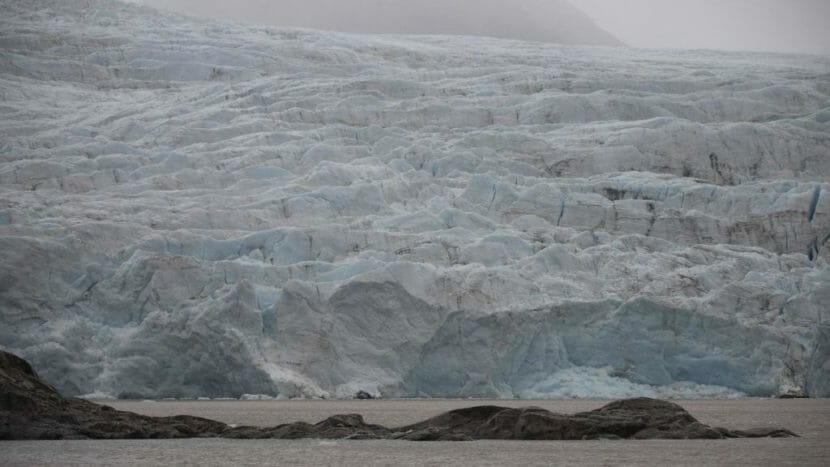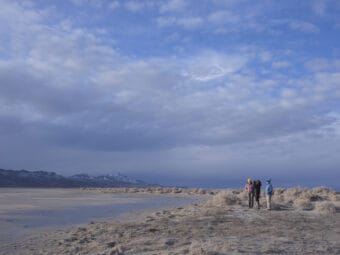
Rising global temperatures are melting our planet’s glaciers, but how fast?
Scientists traditionally have relied on photography or satellite imagery to determine the rate at which glaciers are vanishing, but those methods don’t tell us what’s going on beneath the surface. To determine that, scientists have begun listening to glaciers using underwater microphones called hydrophones.
So, what do melting glaciers sound like?
“You hear something that sounds a lot like firecrackers going off or bacon frying. It’s a very impulsive popping noise, and each of those pops is generated by a bubble bursting out into the water,” oceanographer Grant Deane told Morning Edition.
Deane, a research oceanographer at the Scripps Institution of Oceanography who says he was inspired by a 2008 paper co-authored by renowned oceanographer Wolfgang Berger, hopes that listening and understanding these glacial noises will help him and his colleagues predict sea level rise.
“If we can count the bubbles being released into the water from the noises that they make, and if we know how many bubbles are in the ice, we can figure out how quickly the ice is melting. We need to know how quickly the ice is melting because that tells us how quickly the glaciers are going to retreat. We need to understand these things if we’re going to predict sea level rise accurately,” Deane says.
And predicting sea level rise is crucial, as hundreds of millions of people are at risk around the world — including the 87 million Americans who live near the coastline. Deane says that even a modest rise in sea levels could have devastating impacts on those communities.
Copyright 2022 NPR. To see more, visit https://www.npr.org.
9(MDEwMjQ0ODM1MDEzNDk4MTEzNjU3NTRhYg004))
Transcript
RACHEL MARTIN, HOST:
We know a lot about the effects of climate change, and we can see the impact it’s having. But what does climate change sound like? Some scientists who study glaciers have been listening.
A MARTINEZ, HOST:
They use underwater microphones known as hydrophones. Grant Deane, a research oceanographer at the Scripps Institution of Oceanography, says that gives them a deeper insight into how fast the glaciers are melting.
GRANT DEANE: I think the audio offers advantages that are difficult to get elsewhere. Pictures won’t tell you what’s going on under the water.
MARTIN: What does a glacier sound like? This is the Hans Glacier in southwestern Spitsberg, between Norway and Greenland.
(SOUNDBITE OF WATER FLOWING AND ICE CRACKING)
DEANE: When you put a hydrophone in the water, you hear all kinds of things. You hear the ice melting, sure. You also hear ice breaking off the ice drift. And our very first job was to catalog those different sources, understand their properties and make sure that we can distinguish one source from another.
MARTINEZ: So what does that rapid drip sound to scientists about glacier melt? Here’s Oregon State University glaciologist Erin Pettit.
ERIN PETTIT: I can listen to these sounds and actually get a feel for what the glacier is doing just from listening. And if we listen enough and we know something about the glacier behavior, we can link that together and think of it as a whole system and how the sound can give us clues to changes before our eyes might notice.
MARTIN: And deciphering those audio clues could mean getting more accurate forecasts of sea level rise, says Grant Deane.
DEANE: If we can count the bubbles being released into the water from the noises that they make, we can figure out how quickly the ice is melting. We need to understand these things if we’re going to predict sea level rise accurately.
MARTINEZ: Sea level rise presents a serious problem. Deane says even a small increase will make that problem worse. At least we know the scientists are listening. Transcript provided by NPR, Copyright NPR.



